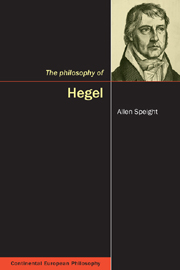Book contents
- Frontmatter
- Contents
- Acknowledgements
- Abbreviations
- Introduction
- 1 German Idealism and the young Hegel
- 2 The Phenomenology of Spirit
- 3 The Logic and Hegel's system
- 4 Ethics and politics
- 5 Hegel and the narrative task of history
- 6 Art, aesthetics and literary theory
- 7 Religion and philosophy
- Notes
- Guide to further reading
- Bibliography
- Index
7 - Religion and philosophy
- Frontmatter
- Contents
- Acknowledgements
- Abbreviations
- Introduction
- 1 German Idealism and the young Hegel
- 2 The Phenomenology of Spirit
- 3 The Logic and Hegel's system
- 4 Ethics and politics
- 5 Hegel and the narrative task of history
- 6 Art, aesthetics and literary theory
- 7 Religion and philosophy
- Notes
- Guide to further reading
- Bibliography
- Index
Summary
Perhaps no facet of the philosophical turn taken by modernity has been so essential to the self-construal of philosophy itself as the stance it has taken towards the traditional place of religion and theology. Certainly no element of the modern philosophical project proved to be as controversial as the philosophical demand for the autonomy of its own enterprise. The importance of Hegel's philosophy of religion as a consummate moment in that modern philosophical turn may be estimated both by its immediate impact on the philosophical world and by its continuing importance for the modern – and postmodern – construal of the question of religion.
First, in the history of the reception of Hegelian philosophy, it is clear that Hegel's philosophy of religion was in many ways the primary point of contention and self-identification among Hegel's immediate followers. As is well known, a large part of the division among “left”, “centre” and “right” Hegelians concerned precisely the issue of how to interpret religion in the philosophical world after Hegel. (One of Hegel's students went so far, for example, as to claim that philosophical debate in the crucial decade after Hegel's death was focused only on the status of two issues in Hegel's philosophy of religion: the ideas of God's personality and the immortality of soul.)
But Hegel's philosophy of religion is not important merely for the task of reconstructing the intellectual history of his followers but also, in a more wide-ranging way philosophically, for the ongoing attempt to understand the place of religion and religious thought in modern life.
- Type
- Chapter
- Information
- The Philosophy of Hegel , pp. 117 - 132Publisher: Acumen PublishingPrint publication year: 2008

